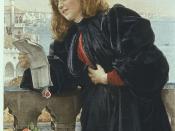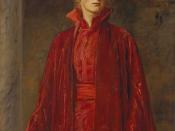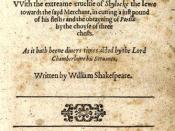Appearances and Decisions ''Don't judge a book by its cover'' is a famous phrase everyone has heard. In the play, The Merchant of Venice, Shakespeare clearly states that outer appearances aren't important throughout many scenes in the play. The inner qualities such as honesty, charity, and kindness are more important. Portia, a beautiful woman, hopes to find a husband ,but she must fulfill her father's will. He designs a lottery of three caskets which involves a test of character. The three caskets are gold, silver, and lead. The three suitors that come to to win Portia's hand in marriage and thus use or don't use appearances in their judgements are the Prince of Moracco, the Prince of Arragon, and Bassanio.
First, the most obvious character obsessed with looks is the Prince of Moracco. He is the first suitor to see the caskets. The first comment he makes to Portia is about his physical appearance.
He tells Portia not to ''Mislike me for my complexion...''(II,i,1). He does not want Portia to dislike him for his skin tone. He is aware of of the color of his skin and thinks other people may not like it. When he is choosing the caskets, he reads the passage of each. The gold casket reads ''Who chooseth me shall gain what many men desire.''(II,vii,36). He mistakes the meaning and thinks it means that Portia is what all men desire. He also says that ''Never so rich a gem Was set in worse than gold.''(II,vii,54-55). Portia is so beautiful that he thinks her father would not have put her portrait in anything less than gold. He glances at the silver casket but says that gold is ten times as better. He barely looks at lead because it is so ''....dull...''(VII,ii,8). He chooses gold and loses. The casket reveals a skull with a scroll that says, ''All that glisters is not gold...''(VII,ii,65) which means he should not pick the casket because of its looks. Everything that is pretty might not be like that on the interior. The Prince of Moracco loses his chance of marriage because of appearance.
Second, the Prince of Arragon uses outer characteristics for his judgement. He looks over the passages of the caskets and comments on the inscription of the lead one. It says ''Who chooseth me must give and hazard all he hath.''(II,ix,21). He says that lead should look fairer before he picks it. He does not like the gold casket either because he thinks a fool would choose by its looks. He is aware of the messages on the caskets and judge them entirely on appearances even though he won't pick lead. He picks the silver casket and finds a ''....blinking idiot...''(II,ix,54) inside. It says he is a fool and is done for. The Prince of Arragon did let appearances interfere with his judgement.
Third, Bassanio is the only character not concentrated entirely on outer looks. He says ''...the outward shows be least themselves...''(III,ii,73). This means that the outer physical appearances do not show the inner beauty. The lead casket could be ''...hiding the grossness with fair ornament.''(III,ii,80).The lead casket could have a portrait of the pretty Portia even though the casket is not as lovely. The gold casket is ''...but the guiled shore to a most dangerous sea.''(III,ii,97-98). It is very attractive, but the gold is hiding something bad. Bassanio thinks the lead casket is the correct one because its ''...paleness moves [him] more than elequence.''(III,ii,106). The appearance of the casket does not affect his decision.
He picks the lead casket and Portia's portrait is inside of it. He gets to marry her.
Bassanio wins because his decision is not based upon the looks of the other caskets.
Last, the suitors: the Prince of Moracco,the Prince of Arragon, and Bassanio learn the moral of the play. They learn that appearances do not count as much as the interior. Bassanio looks more into depth at the meaning of the caskets and that is why he wins.





